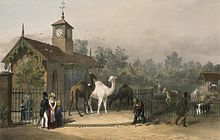Ha nem vagy teljesen kezdő, a
fordításnak is sikerülnie kell!
Segítség a nyelvtanhoz:
* felszólítás (videó)
* felszólítás_mondatok
Wikipedia: A zoo (short for zoological garden or zoological park, and also called an animal park or menagerie) is a facility in which animals are confined within enclosures, displayed to the public, and in which they may also be bred.
The term zoological garden refers to zoology, the study of animals, a term deriving from the Greek zōon (ζῷον, "animal") and lógos (λóγος, "study"). The abbreviation "zoo" was first used of the London Zoological Gardens, which opened for scientific study in 1828 and to the public in 1857. The number of major animal collections open to the public around the world now exceeds 1,000, around 80 percent of them in cities. In the United States alone, zoos receive over 180 million visitors annually...
...In April 1999, the European Union introduced a directive to strengthen the conservation role of zoos, making it a statutory requirement that they participate in conservation and education, and requiring all member states to set up systems for their licensing and inspection. Zoos are regulated in the UK by the Zoo Licensing Act of 1981, which came into force in 1984. A zoo is defined as any "establishment where wild animals are kept for exhibition ... to which members of the public have access, with or without charge for admission, seven or more days in any period of twelve consecutive months," excluding circuses and pet shops. The Act requires that all zoos be inspected and licensed, and that animals kept in enclosures are provided with a suitable environment in which they can express most normal behavior...
...In many countries, feeding live vertebrates to zoo animals is illegal, except in exceptional circumstances. For example, some snakes refuse to eat dead prey. However, in the Badaltearing Safari Park in China, visitors can throw live goats into the lion enclosure and watch them being eaten, or can purchase live chickens tied to bamboo rods for the equivalent of 2 dollars\euros to dangle into lion pens. Visitors can drive through the lion compound in buses with specially designed chutes which they can use to push live chickens into the enclosure. In the Xiongsen Bear and Tiger Mountain Village near Guilin in south-east China, live cows and pigs are thrown to tigers to amuse visitors.
In Qingdao zoo (Eastern China), visitors can engage in "tortoise baiting", where tortoises are kept inside small rooms with elastic bands around their necks so that they are unable to retract their heads. Visitors are allowed to throw coins at them. The marketing claim is that if you hit one of the tortoises on the head and make a wish, it will be fulfilled.


_-_THE_NOBEL_PEACE_PRIZE_LAUREATES_FOR_1994_IN_OSLO..jpg/220px-Flickr_-_Government_Press_Office_(GPO)_-_THE_NOBEL_PEACE_PRIZE_LAUREATES_FOR_1994_IN_OSLO..jpg)